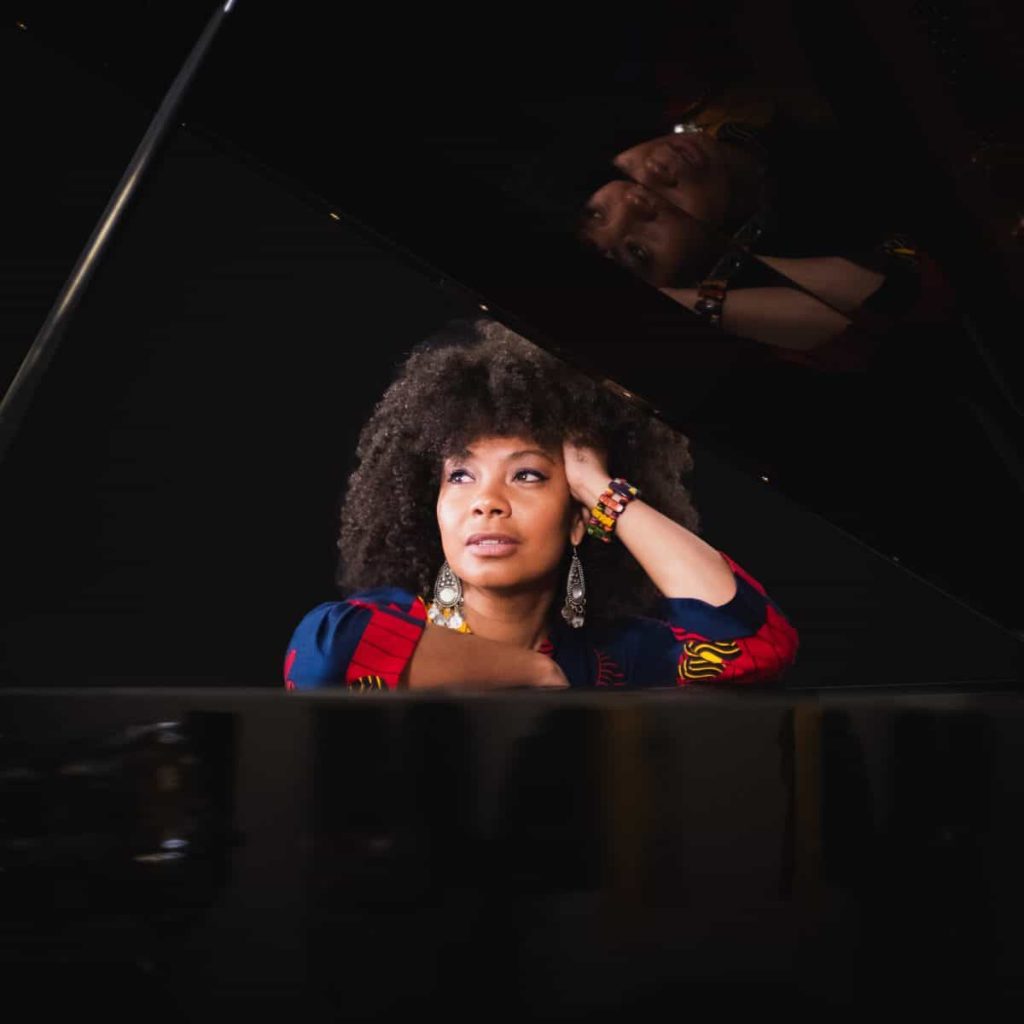Photo: Danny Galindo
by Lee Roscoe
Jazz pianist Zahili Gonzalez Zamora grew up in Cuba, where she says about Castro’s regime, “some things worked, and some did not. I lived one hundred percent through the depression of the nineties, when the Soviet Union pulled out. There was not enough to eat, and no electricity.” But on the other hand the lack of information coming in from the outside world led to a self-sufficient insularity, where she says, “We were surviving, and we would go out and still see people smiling; because of that we made the best with all we had, and it taught me to live my days.”
Zamora will perform with Bart Weissman on drums, and Ron Ormsby on bass at the upcoming Provincetown Jazz Festival August 8th. (Guitarist Steve Hambleton will open the concert with the duo of Weissman and Ormsby, as well.)
She found the household piano at age six and her grandma noticed her incipient talent and took her to music school, which, like education, was free in Cuba.
She was the only Black girl at the conservatory, and there was racism; she later realized she had been treated differently than other students, noting that after Brazil, Cuba had the highest amount of enslaved people, perhaps even more than the United States. That history is part of who she is. As is the music of her country. Spanish classical composers like Ernesto Lecuona, Ignacio Cervantes, and Manuel Saumell Robredo, as well as Liszt and Chopin influenced her, as well as the rhythms of Africa, salsa and “timba,” the clave Cubana.
While still in her teens she performed with an all-female band. On a third tour in Canada, and decided to stay, eventually becoming citizens. It was in Canada that she began to learn English, which she is now fluent in. From Canada she went to Macau on a gig, ended up staying for six years, playing in the hotels for the casinos of the Las Vegas of Asia. She was the pianist for bands which played Top-40 hits. The first set was always jazz; then there was dance music. “I was falling in love with the first set,” and though she knew little about jazz, she picked it up intuitively.
Some of the musicians were Berklee College of Music grads who suggested she study there. She applied, receiving a scholarship, and after 15 years of playing music professionally, got her B.A. summa cum laude. She just received her masters degree as well and now teaches piano techniques at Berklee. “My students are treasures. I don’t believe in treating them all equally,” because they all have different gifts and personalities which she wants to bring out to their best; they all “have anxieties and insecurities” which some of her courses specifically target.
The subject of her thesis and her urge to teach link up, for she says, “I want not just to entertain, but to be of service.” She wants to explore what she feels about racism, musically, “what I feel about mental health issues, and how that affects the creative mind. I want my music to have a message, to leave an audience with food for thought.” When she writes music, she’s often working out an idea, an issue in her head. “I’m always just looking out, seeing what issues are there and how is that affecting me, and I find that is my inspiration.”
She talks about being a woman in her field — though there is more inclusion of women composers in general, “we have to work so hard; as women we have to constantly be observant of how we speak, the idea that we’re always comparing ourselves to men.” But it’s opening up, way better than in past decades. She says people have to want diversity and inclusion, but that she has been lucky in finding it.
When she discovered jazz, she had so many influences coming in at her, she knew she had to make her approach more concise, more focused. ¡°It took me leaving Cuba to understand where I came from.” Though she studied classical piano for 13 years, it was the hybrid ¡°rhythms and lyricism of music of Cuba with some of the pop music I have been exposed to,” that ultimately grounded her own compositions and performance.
She founded her own trio, MixCla. Her husband, the bass player is from Chile, their percussionist from Japan, so “we were aware of our roots” and merged the rhythms and styles into a mix which was both hot and cool, rocking, and introspective. It’s a kind of Keith Jarrett meets Ravel and Mongo Santamaria.
Many of Zahili’s new compositions and arrangements will be recorded soon, adding to her MixCla discography. She continues to play as an independent artist with many musicians mostly around the Boston area where she lives, such as Grammy-winning guitarist Claudio Ragazzi and Patricia Zarate, a Chilean-born saxophonist.
In Provincetown the serious side will be put away. Weissman has asked her to form the collaborative repertoire. “There will be songs from home which I listened to, and play and sing, some bossa nova.” There will be standard jazz classics from the American songbook, and boleros (Cuban ballads) with a groove which she has composed.
“When I play one of the best things that can happen to me is to be on stage collaborating with other people and playing, being able to give in to the music, to give an honest performance to have an audience that connects with the music.” Her many awards and honors attest to that connection.
Zahili Gonzalez Zamora performs in this year’s Provincetown Jazz Festival on Tuesday, August 8, 6 p.m. at the Provincetown Art Association and Museum, 460 Commercial St. For more information and tickets ($35) visit provincetownjazzfestival.org.











